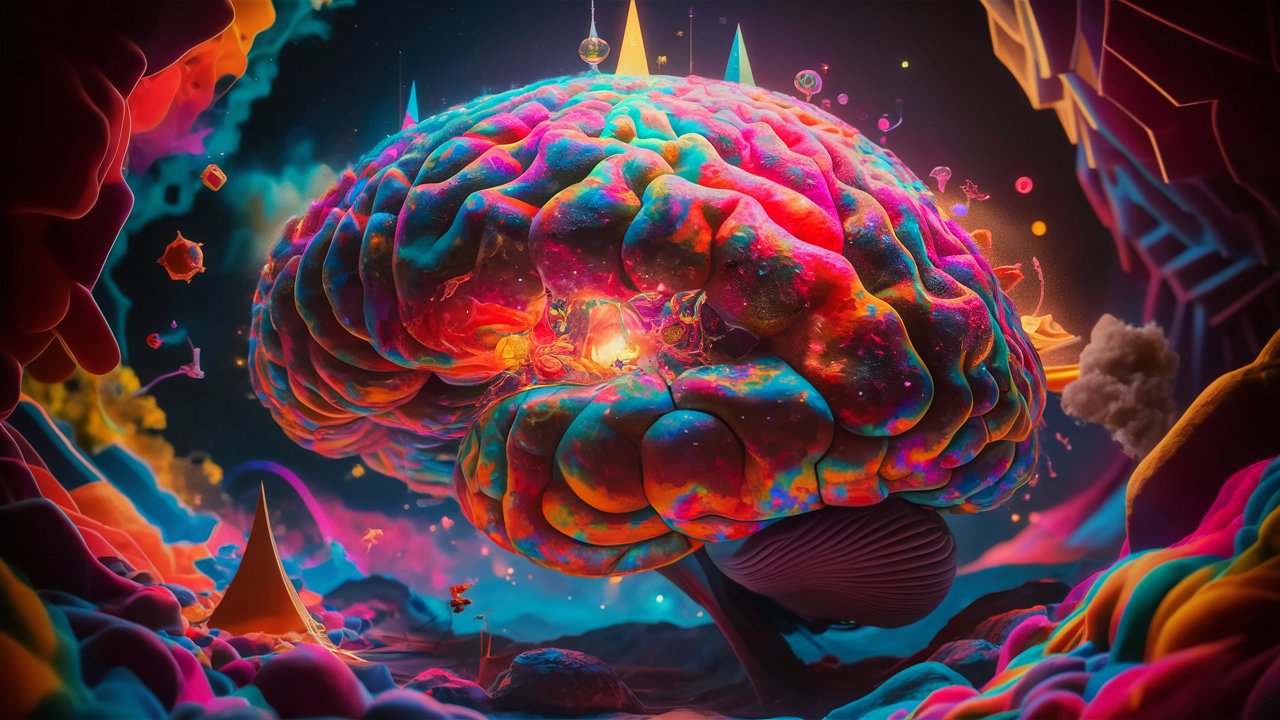Magic Mushrooms: A Mind-Bending Mystery
Imagine popping a pill that could completely change how your brain works. That’s exactly what scientists are discovering about a special ingredient found in magic mushrooms called psilocybin.
People who’ve tried psilocybin often describe having incredibly powerful experiences. These experiences can be so intense that it’s hard to put them into words. It’s like stepping into a whole new world.
To understand what’s happening inside the brain during these trips, scientists used special machines called MRI scanners to take pictures of people’s brains before, during, and after taking psilocybin. What they found was astonishing.
When people take psilocybin, their brains go into overdrive. It’s like turning a normal face into a dog face – different, but still recognizable. This means the drug completely changes how different parts of the brain talk to each other.
Amazingly, most of these brain changes go away after a day. But one important change sticks around for weeks. This change affects two key parts of the brain: the DMN, which helps us understand ourselves, and the hippocampus, which is important for memory.
Scientists are still trying to figure out what this long-lasting brain change means. They don’t know yet how it affects people or if it’s good or bad.
But these discoveries are super exciting for people who study mental health. Psilocybin might be helpful for treating depression, anxiety, and other mental problems. By understanding how it changes the brain, scientists might be able to create better treatments for these conditions.
It’s clear that psilocybin has a powerful effect on the brain. We’re just starting to understand how it works, but the future looks promising for finding new ways to help people with mental health issues.

Unraveling the Brain’s Mystery
So, what exactly is happening inside your head when you take psilocybin? Imagine your brain as a busy city with different neighborhoods. Each neighborhood has its own job to do, and they all need to work together smoothly for the city to function.
Psilocybin is like a powerful storm that comes through the city and shakes everything up. The neighborhoods start to behave differently, and some of them even forget how to talk to each other. This chaos is what creates the mind-bending experiences people have.
But after the storm passes, most of the city goes back to normal. However, two important neighborhoods – the one where we think about ourselves and the one where we store memories – seem to have changed their relationship. Scientists aren’t sure why this happens or what it means yet.
A New Hope for Mental Health
While psilocybin can be a wild ride, it might also hold the key to unlocking new treatments for mental health problems. Imagine if we could harness the power of this drug to help people overcome depression or anxiety.
Scientists are cautiously optimistic about the potential of psilocybin. They’re working hard to understand how it works and to find safe and effective ways to use it as a medicine.
It’s important to remember that psilocybin is still being studied, and we don’t fully understand all its effects. It’s crucial to approach this topic with caution and respect.
Let’s delve deeper into the potential benefits of psilocybin for mental health and the ethical considerations surrounding its use.
The Promise of Healing: Psilocybin and Mental Health
One of the most exciting aspects of psilocybin research is its potential to revolutionize mental health treatment. Studies have shown promising results in treating conditions like depression, anxiety, and PTSD.
- Depression: Psilocybin-assisted therapy has been shown to rapidly reduce symptoms of depression, often with long-lasting effects.
- Anxiety: Individuals with treatment-resistant anxiety disorders have reported significant improvements after psilocybin-assisted therapy.
- PTSD: Some studies suggest that psilocybin can help individuals with PTSD process traumatic memories and reduce symptoms.
How does psilocybin achieve these effects? It’s believed that by disrupting rigid thought patterns and increasing brain plasticity, psilocybin can help individuals develop new perspectives and coping mechanisms.

Ethical Considerations and the Road Ahead
While the potential benefits of psilocybin are promising, it’s essential to approach this topic with caution and ethical considerations.
- Safety: The use of psychedelic substances can be risky, and careful monitoring is necessary to ensure participant safety.
- Legal Status: Psilocybin is still illegal in many places, which hinders research and access to potential treatments.
- Therapeutic Setting: The therapeutic setting is crucial for maximizing the benefits of psilocybin-assisted therapy. Trained therapists are essential to guide individuals through the experience.
- Long-Term Effects: More research is needed to understand the long-term effects of psilocybin on the brain and overall well-being.
As research progresses, it’s crucial to strike a balance between scientific exploration and ethical responsibility. By addressing these concerns and conducting rigorous studies, we can unlock the full potential of psilocybin as a therapeutic tool while safeguarding the well-being of participants.
Would you like to explore specific studies or delve deeper into the mechanisms of how psilocybin might be helping with mental health conditions?
